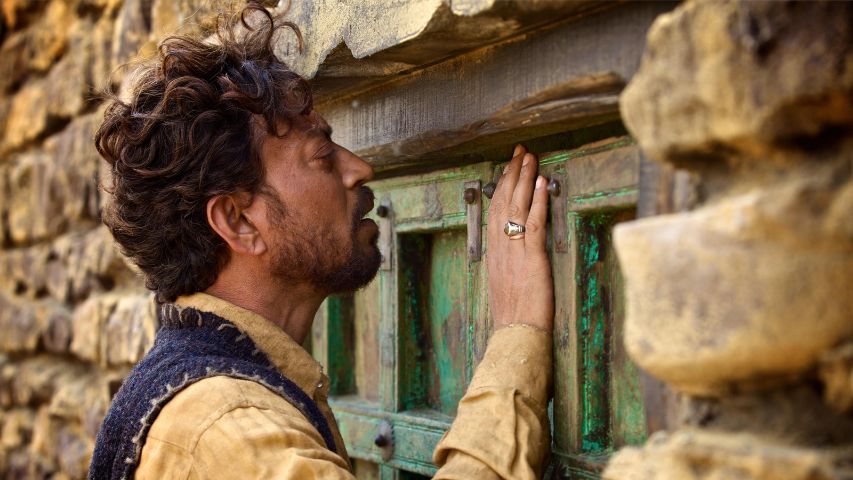-853X543.jpg)
A BEFITTING SWANSONG
by Janaky Sreedharan September 9 2023, 12:00 am Estimated Reading Time: 4 mins, 44 secsThis is a very personal response to a unique film experience gifted by The Song of Scorpions, writes Janaky Sreedharan
Irrfan Khan's charismatic presence was definitely the foremost factor that drew me to his final theatrical release. Not only because of the gravitas he imparted to his roles whatever kind they may be. Also, the fact that he had come to be associated with a certain kind of cinema that paid close attention to its language, its form and its efforts to go beyond the obvious and the populist. The Song of the Scorpions is as elusive and compelling as its title suggests - brooding and heavy with no easy passage out. The wounds are open and raw and you cannot slip away from the stark reality of it all even as it is shrouded in the garb of a folktale. But folk tales are hardly easy smooth or generous. Very often they are more bitter, upfront and marked by a brutal honesty.
And, as the film unfolds through the treacherous desertscapes of Rajasthan, I was once again in the eighties world of parallel cinema helmed by the likes of Shyam Benegal and Govind Nihalani, where the landscape, the people and everyday struggle fused into an immersive cinematic experience. What the director Anup Singh evoked in me was not just the precious memory of a past cinema but also a cinema of hope and future. A serious solemn pact cinema has made with the viewer to take her beyond the realm of the modern and rational into a realm of myth, folktale and rhythms of the land. An imagination fed by centuries of storytelling and an idiom of life rooted in a pre-modern sensibility and intuitive truth. For a slow-paced film with an ominous background score escorting us into the narrative, the direction keeps you riveted to the screen, mystified by the network of obsession, revenge, lust, love and redemption.
Nooran, a tribal singer and a healer, unravels her myriad shades through the empathetic performance of Golshifteh Farahani. She is believed to have the power to heal the deadly scorpion bites through her song, which sounds like a deep mourning melody rising high into the sky and leaving a vanishing, smoky trail behind.
Raped and distraught, the beautiful Nooran becomes a woman in search of her soul, a woman who has lost her song, which is her identity. The film delves into the traumatized psyche of a raped woman, upturning all the familiar images, which have either trivialized or glorified her as a victim. That sequence where Nooran walks into the desert night and whispers her own name into the forlorn landscape sends a sharp cry of pain through you. Her tender bond with her grandmother elegantly essayed by Waheeda Rehman invokes the female traditions of singing and healing within the indigenous communities.
The film is anchored in a woman's quest for her lost self, a selfhood shaped through her music. A music taught not by humans but learnt from the elements - from the moon, the wind and the stars. Never before have I seen on screen a woman doing her Riyaz at night out there under the dark sky, alone and strong.

The cinematography wins one over, not only for the breath-taking expanse of the desert clad in an eerie light and shadows, but also for the way in which the community becomes the focus and not the individuals by themselves. Whether it be Nooran, Aadam or Amina, they are intertwined with the landscape and the elements, the wind the sun, the sand, the camels and the inky night sky. Close ups are deliberately avoided to embed the characters in their cultural milieu. The film probes tortuously into the complexity of human subjectivity, beyond the logic of modernity where a different framework of values and justice operates. The narrative straddles many time frames, the past and the contemporary, where mobile phones sit comfortably alongside songs that heal the scorpion bites. Is the scorpion a metaphor of the lethal toxicity we have become habituated to? And is the healing song a myth, an illusion or a lost instinct, so very unlike the tunes churned out through an over productive market?
This film a is as enigmatic as Anup Singh's earlier directorial film Qissa, and the viewer has to get under the skin of the film becoming a part of this journey herself. The film demands you to dig deeper and unearth your own nuggets of insight - as each one would take away her own gem from the dark quarry of human life laid bare here.
Aadam, the obdurate lover, reacts through violence to attain his beloved. Nooran, raped out of a vengeful attraction, defies all the familiar narratives of victimhood. Responses are not black and white nor are the answers. But the suffering hangs heavy, like a heavy smog between them, refusing to go away. Script is taut with a subdued acting, making it even more hard-hitting. The quietness is not just an acting technique but an attitude to life carefully nurtured by less than ordinary people in the world. Poor and powerless.
Sometimes revenge and obsession become words too weak to capture the depth and intricacies of emotions. The ending leaves you in a churning space - disturbed and silent. Inscrutable are the ways of the human hearts brilliantly captured by both Irrfan Khan and Golshifteh Farahani.
Shashank Arora already a favourite through his easy presence in the Made in Heaven web series promises more to come. The film becomes a homage to the sense of the tragic, and one can only bow one's head before this most befitting swansong of Irrfan Khan.




-173X130.jpg)
-173X130.jpg)

-173X130.jpg)
-173X130.jpg)
-173X130.jpg)
-173X130.jpg)
-173X130.jpg)